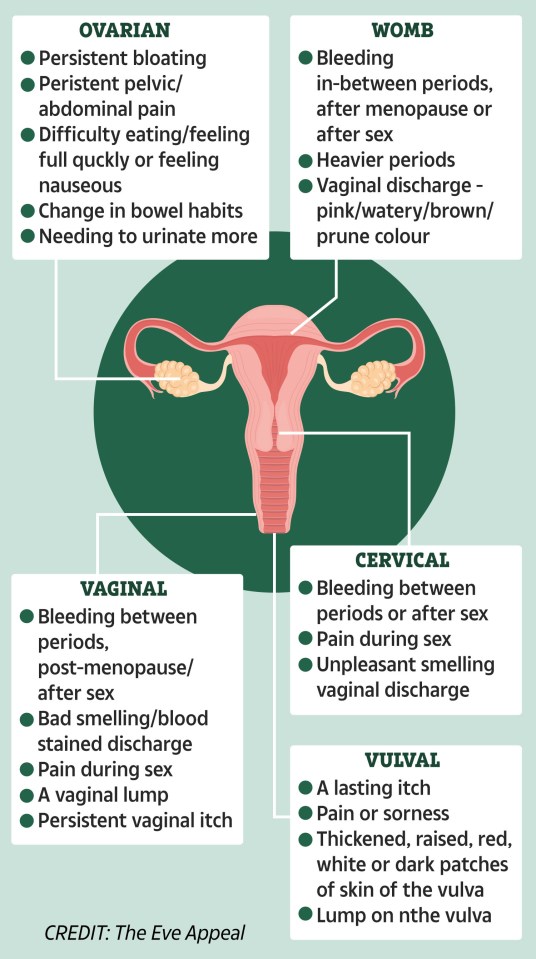ALMOST one in three women have put off seeing their GP about worrying gynaecological symptoms that could be signs of cancer, a leading charity has warned.
There are five cancers affecting gynaecological organs, causing symptoms like unusual discharge, bleeding between periods or after the menopause, lumps and pain during sex.
The Eve Appeal – a gynae cancer charity – warned that many women may ignore these red flag signs or delay seeing a doctor about them out of embarrassment.
A survey of 1,070 women found that one in three had postponed seeing a GP about possible cancer symptoms.
Nearly one in three respondents also said they would feel nervous, anxious, or uncomfortable speaking to a doctor about gynaecological health issues.
Another 25 per cent revealed they’d feel embarrassed speaking to their GP about such symptoms.
Sixty per cent of the respondents said that seeing a female GP would help them feel more comfortable about getting gynaecological symptoms checked.
Knowing their GP specialised in women’s health (46 per cent) and previously having had a positive experience with their GP (40 per cent) would also prompt them to get symptoms checked more quickly, they said.
Another one in four women said they’d feel more comfortable getting symptoms checked if they saw a GP they knew (24 per cent), and if the GP prompted them to open up by asking questions like “Is there anything else bothering you?” (23 per cent).
Dr Aziza Sesay, GP, said: “As a GP, these statistics don’t surprise me.
“I’ve seen so many women who come in with one issue, and then once they feel more comfortable, they open up about something else they’ve been struggling with for a long time, usually in silence – often too embarrassed to mention it at first.
“From symptoms of prolapse and urinary incontinence to bleeding after menopause and vulval swelling.
“Sadly, in some cases, the delayed presentation has led to a cancer diagnosis at a later stage.
“Destigmatising conversations around these symptoms and breaking the taboo can quite literally save lives.”
Gynaecological cancers – which include womb, ovarian, cervical, vulval and vaginal cancer – affect 22,050 women and people with ovaries each year in the UK.
According to The Eve Appeal, this amounts to 60 people a day receiving a diagnosis, and sadly 22 of them will die from their cancer.
So picking up these cancers early and getting possible signs of them checked as soon as possible can make a real difference
As it launches its annual Get Lippy campaign for May, The Eve Appeal is raising awareness around red flag symptoms of the five diseases.
1. Ovarian cancer
Nearly 7,500 people are diagnosed with ovarian cancer every year in the UK, making it the sixth most common cancer in women.
It’s most frequently diagnosed post-menopause, but it can affect anyone with ovaries at any stage of life.
The five main ovarian cancer symptoms are:
- Increased abdominal size and persistent bloating (not bloating that comes and goes)
- Persistent pelvic and abdominal pain
- Unexplained change in bowel habits
- Difficulty eating and feeling full quickly, or feeling nauseous
- Needing to wee more regularly
Sufferers may also experience back pain, fatigue, weight loss and pain during sex.
2. Womb cancer
Womb cancer may also be referred to as uterine or endometrial cancer.
It’s also the fourth most common gynaecological cancer, with over 9,700 people diagnosed every year in the UK.
According to The Eve Appeal, cases have increased by 12 per cent in the last decade.
Abnormal vaginal bleeding is the main symptom of womb cancer, around nine out of 10 sufferers are diagnosed after their abnormal bleeding was investigated.
This irregular bleeding might be:
- Vaginal bleeding after the menopause
- Bleeding between periods
- Bleeding that is unusually heavy
- Vaginal discharge that is blood-stained (pink, brown, red)
3. Vulval cancer
Vulval cancer is rare, affecting around 1,350 people a year in the UK – mostly women over the age of 60.
But younger women are also being diagnosed with the cancer, so they should know to look out for:
- A lasting itch on the external genitalia (vulva)
- Pain or soreness on the external genitalia
- Thickened, raised, red, white or dark patches on the skin of the external genitalia
- An open sore or growth visible on the genital skin
- A mole on the external genitalia that changes shape or colour
- A lump or swelling on the external genitalia
4. Vaginal cancer
Vaginal cancer is rarer, with 250 people diagnosed with it in the UK each year.
Almost half (40 per cent) of cases are spotted in people over 75.
The most common signs include:
- Abnormal bleeding, eg. between periods, after menopause
- Discharge with an unpleasant smell or blood stained
- Pain during penetrative sex
- An internal lump or growth that you or your doctor can feel
- An internal itch that won’t go away and pain when urinating
- Persistent pelvic and internal pain
5. Cervical cancer
Cervical cancer is cancer of the cervix, which connects the womb and vagina – this is also sometimes referred to as the neck of the womb.
It can affect patients at any age, but the incidence is highest in women aged 30 to 34.
Cervical screening programmes and HPV vaccines have reduced rates and save 4,000 lives each year, but there are still around 3,250 new cases in the UK annually, The Eve Appeal warned.
The symptoms of cervical cancer aren’t always obvious, and it may not cause any at all until it’s reached an advanced stage.
But you might notice:
- Unusual bleeding, often after sex
- Pain and discomfort during sex
- Unpleasant smelling vaginal discharge
Previously offered only to girls, the HPV shot is now available to all 12- and 13-year-olds regardless of gender, and can provide a a vital defence against eight types of cancer – including cervical.
Cervical cancer screening
Nearly all cervical cancers are caused by an infection with certain high-risk types of human papillomavirus (HPV).
HPV is the name for a very common group of viruses that most people will get some type of HPV during their lives.
It’s very common and nothing to feel ashamed or embarrassed about.
You can get HPV from any kind of skin-to-skin contact of the genital area, not just from penetrative sex.
This includes:
- Vaginal, oral or anal sex
- Any skin-to-skin contact of the genital area
- Sharing sex toys
In most cases your body will get rid of HPV without it causing any problems.
But sometimes HPV can stay in your body for a long time and some types of high risk types of HPV can cause cervical cancer.
If high risk types of HPV stay in your body, they can cause changes to the cells in your cervix. These changes may become cervical cancer if not treated.
How to lower your risk of cervical cancer
You can’t always prevent cervical cancer. But there are things you can do to lower your chances of getting cervical cancer.
Cervical screening and HPV vaccination are the best ways to protect yourself from cervical cancer.
- All women and people with a cervix between the ages of 25 and 64 are invited for regular cervical screening. It helps find and treat any changes in the cells of the cervix before they can turn into cancer.
- All children aged 12 to 13 are offered the HPV vaccine. It helps protect against the types of HPV that cause most cases of cervical cancer, as well as some other cancers and genital warts.
You can also lower your chance of getting cervical cancer by:
- Using condoms, which lower your chance of getting HPV – but they do not cover all the skin around your genitals so you’re not fully protected
- Quitting smoking – smoking can weaken your immune system and the chemicals in cigarettes can also cause cervical cancer
Source: NHS
Know your normal
Athena Lamnisos, The Eve Appeal CEO, said: “We know that health prevention and early diagnosis are key when it comes to cancer and that’s a two-way street.
“We need patients to feel informed and confident and we need doctors to support open conversations and dispel embarrassment.
“Throughout May, we’ll be highlighting this issue and providing tips and information which will stop women thinking ‘it’s probably nothing’ and ignore possible symptoms and get them checked.”
Shalisha James-Davis, who was diagnosed with ovarian cancer, says: “The fact that I am a young woman played a huge part in my delayed cancer diagnosis.
“I know I still do not look like a cancer patient but that should not be a reason for my symptoms to not be taken seriously.
“I now know what I need to look out for and what is not my normal and I’m hoping to encourage other young women to get to know their own bodies so that they can advocate for themselves.
“Remembering that if something doesn’t feel right, get it checked out.”



